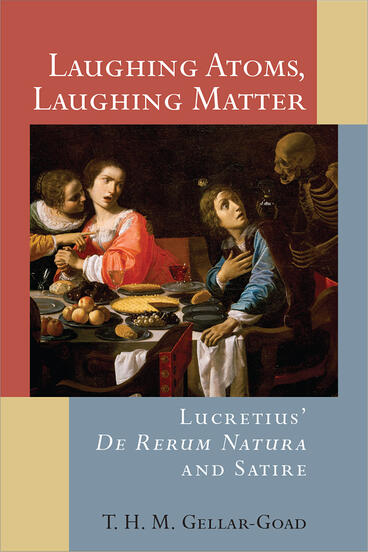Laughing Atoms, Laughing Matter
Lucretius' De Rerum Natura and Satire
Unexpected satire in a classic philosophical text
Description
Laughing Atoms, Laughing Matter: Lucretius' De Rerum Natura and Satire offers the first comprehensive examination of Roman epic poet Lucretius’ engagement with satire. Author T. H. M. Gellar-Goad argues that what has often been understood as an artfully persuasive exposition of Epicurean philosophy designed to convert the uninitiated is actually a mimesis of the narrator’s attempt to effect such a conversion on his internal narrative audience—a performance for the true audience of the poem, whose members take pleasure from uncovering the literary games and the intertextual engagement that the performance entails.
Gellar-Goad aims to track De Rerum Natura along two paths of satire: first, the broad boulevard of satiric literature from the beginnings of Greek poetry to the plays, essays, and broadcast media of the modern world; and second, the narrower lane of Roman verse satire, satura, beginning with early authors Ennius and Lucilius and closing with Flavian poet Juvenal. Lucilius is revealed as a major, yet overlooked, influence on Lucretius.
By examining how Lucretius’ poem employs the tools of satire, we gain a richer understanding of how it interacts with its purported philosophical program.
T. H. M. Gellar-Goad is Associate Professor of Classics and Zachary T. Smith Fellow, Wake Forest University.
Reviews
“Laughing Atoms, Laughing Matter fills a serious gap in the scholarship on Lucretius that Gellar-Goad correctly identifies, namely the relative lack of attention that has been paid to Lucretius’ use of satire . . . It is quite a pleasure to read.”
—Gordon Campbell, Maynooth University
“Gellar-Goad’s style is erudite while entertaining: something that is difficult to achieve and that, fittingly, reflects something of the nature of Roman satire. An important contribution to studies of both Lucretius and Roman satire.”
—Sergio Yona, University of Missouri
"[T]his insightful book, showing us for the first time how pervasive Lucretius’ satiric usage is, becomes an important one for a broad range of scholars from the history of physics to classicists and those who study the crucial role of poetry on the development of Western thought over the last two millennia."
- Cliff Cunningham
-- Sun News Tucson
"Impeccably researched and accompanied by an exhaustive panoply of scholarly citations (conveniently offered as actual footnotes), this is a remarkable and magisterial contribution to Lucretian scholarship." —CHOICE
- J. S. Louzonis
"G.-G.’s engagingly written analysis of DRN’s satirical aspects and its influence on subsequent Roman satire is both illuminating and convincing, as is his analysis of satire itself and of the interaction between satire and philosophy."
- Jerome Kemp
—The Classical Review
"This is a dense and thoughtful book that makes an important contribution to studies of Lucretius and satire. It well repays time spent with it."
- ExClass
--ExClass
News, Reviews, Interviews
Read: Review of Laughing Atoms, Laughing Matter in Sun News Tucson Link | 5/1/2020

